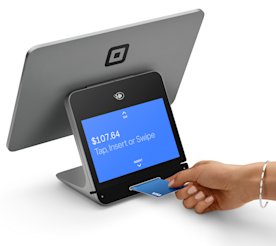Merchant services that meet your business needs

Deciding on a merchant services provider can impact your finances, your operations and ultimately how you serve your customers. Our fully integrated system of hardware, software and services can help any business manage payments and risk.
A quick refresh on merchant services
What are merchant services? Merchant services is an all-encompassing term. It describes the hardware, software and financial services needed for a business to accept and process credit cards and debit cards, NFC-enabled mobile wallets and other contactless payments – online and in-store.

What is a merchant account?
A merchant account establishes a relationship between a business and a merchant services provider, like a bank. This agreement allows a business to accept credit cards and debit cards, along with other forms of payment. Not all merchant services providers require a merchant account. All you need is a dedicated bank account to process payments with Square.
Why do you need a merchant services provider?
Merchant services providers allow businesses to accept credit cards, debit cards and other forms of payment online, through a payment card reader or a point-of-sale (POS) system. Many entities are authorized to be merchant services providers. They generally fall into three categories: banks, independent sales organizations (ISOs) and technology companies like Square.
Our services evolve with businesses in mind
End-to-end payment processing should benefit sellers. That’s why we rethink the status quo.
Why millions choose Square

Tools and services that scale with your ambitions.
If you’re already established, our suite of tools can help you grow. Keep your business connected with our trusted software, APIs and software development kits. Security is engineered into all of our products.

Start taking payments as soon as you say go.
If you’re just starting out, you can get up and running quickly. Our payment options mean you never miss a sale, whether it’s in person, online or on the go. You can be sure everything works together seamlessly with our fully integrated system of POS hardware and software.

Money for whatever’s next.
Take control of your cash flow. Manage your sales when and how you need to as they flow into your Square Balance.2 Make transfers to your bank account, budget for expenses, spend instantly with your Square Card or pay back a loan from Square.3

Always know what you pay.
Square pricing is always transparent. You pay 2.5% per transaction for credit cards processed in person. For debit cards, you pay 0.75% + 7 cents per transaction in person. Online, the rate is 2.8% + 30 cents per transaction and 3.3% + 15 cents per transaction when you key in a customer’s card details or use a card on file.
Consider the total price of working with a provider
Beyond hardware and software, how much are you willing to pay for long-term contracts, PCI compliance, fraud and dispute management and unexpected fees? Working with banks and ISOs often means paying out of pocket for setup, customer support and PCI compliance.
You don’t need to sign a long-term contract to work with Square. Rest easy knowing Square complies with PCI standards and can help you mitigate fraud. Our pricing is transparent.
What you see is what you get: processing fees by payment type and no hidden fees ever.
Square
Your choice
- Processing fees
Other providers
- Interchange downgrades
- Rate fluctuations
- Payment terminal lease fees
- POS software fees
- Authorization fees
- Gateway fees
- Statement fees
- Chargeback fees
- PCI-compliance fees
- Batch fees
- Business card fees
- Non-qualified fees
Custom pricing for your business
If you’re processing more than $250,000 every year in credit card sales, we may be able to design custom pricing packages for your business. Custom pricing will vary depending on your processing volume, average ticket size, your history as a Square seller and many other factors.

Helpful resources and solutions
1Instant transfers require a linked debit card and cost a fee per transfer. Only physical Canadian debit cards with Visa Debit or PLUS network support can be linked to a Square account at this time. Funds are subject to your bank’s availability schedule, but are generally available in your bank account within 20 minutes of initiating an instant transfer. Minimum amount is CAN$25 and maximum is CAN$5,000 in a single transfer. New Square sellers may be limited to one instant transfer per day of up to CAN$500.
2Your Square Balances are not deposits, not CDIC-insured and are not interest-bearing. Terms apply. Learn more.
3Square Card is issued by Square Canada, Inc., pursuant to a licence by Mastercard International Incorporated and may be used wherever Mastercard is accepted. Funds generated through Square payment processing services are generally available through Square Card immediately after a payment is processed. Fund availability times may vary due to technical issues. Square does not charge fees, but ATM withdrawal fees charged by ATM providers may apply. Square Card is funded on a prepaid basis. Square Card is not a bank account and Square Card funds are not CDIC-insured.
All loans are issued by Square Canada, Inc. Actual fee depends upon payment card processing history, loan amount and other eligibility factors. A minimum payment of 1/18th of the initial loan balance is required every 60 days and full loan repayment is required within 18 months. Offer eligibility is not guaranteed. All loans are subject to approval. Not available in Quebec. Terms and conditions apply.